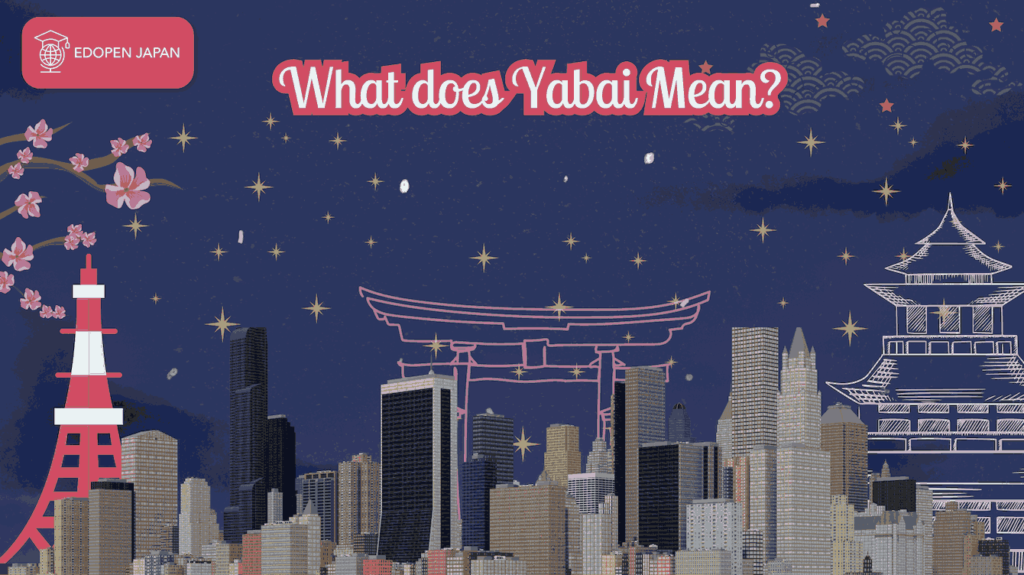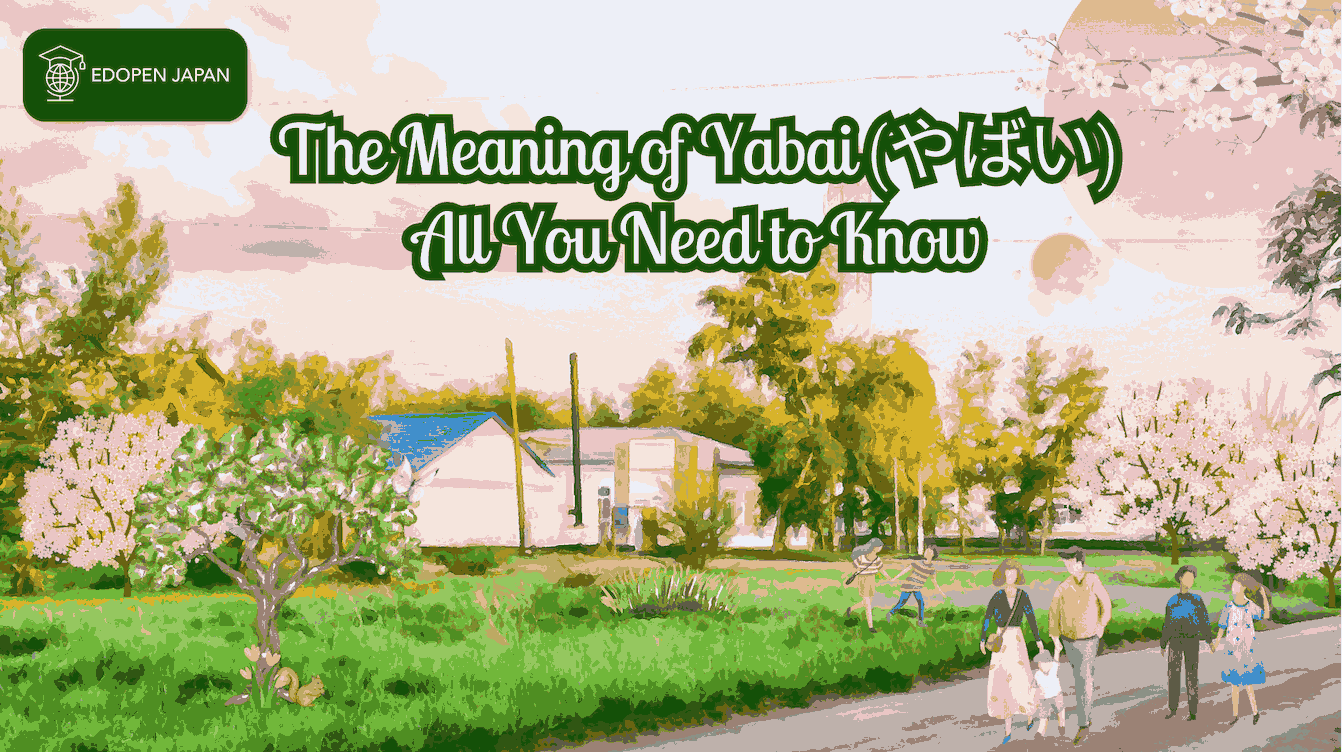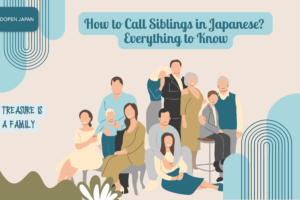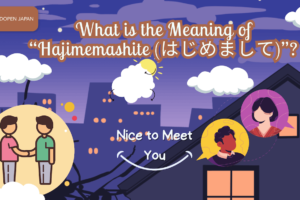Imagine you were standing in the middle of an area where Japan’s youth spend their time, such as Shibuya or Harajuku. You would hear a myriad of words that generally don’t appear in a Japanese textbook, such as “Maji,” “Kusa,” or “Gachi,” among others. But one word you would undoubtedly hear a lot is “yabai”.
In addition, if you are currently learning Japanese phrases that are also very popular and often used in everyday conversation in Japan, please also read our recommendations below!
How to Use “Yoroshiku Onegaishimasu”?
What’s the Meaning of “Sasuga” (さすが)?
What’s the Meaning of “Naruhodo (なるほど)”?
Contents
The Origins of Yabai (やばい)

In fact, no one knows for sure the origin of Yabai, but there are various theories as to where it came from. One of the most widely accepted origins of “yabai” is that criminals who were incarcerated used to call the prison guards with the word “yaba” (厄場). So if they were doing something illegal in prison, the lookout would say “Yaba!” when a guard approached them.
Then, when these people got out of prison, they would start calling something they wanted to avoid “yaba” (厄場) out of habit. The word itself had the purpose of being vague, so that the guards or people who didn’t belong to them wouldn’t understand. In truth, the word itself only meant “dangerous place. Then, little by little, it began to change, and somewhere in between, it took on an adjective form and became the present “Yabai やばい)”.
Another explanation is that it comes from “yaba” (矢場). During the Edo period, this was the name given to the target of an arrow attack during a fight. So, if someone unknowingly approached the “yaba”, it could mean that they were in a precarious situation.
Then it would be used figuratively to denote any dangerous place or situation, because that situation would mean that they would enter the “yaba”. And sooner or later it is expected to become an adjective to describe something precarious as “yabai”.
What does Yabai Mean?

Yabai is commonly written as “ヤバイ” or “やばい” depending on preference. However, in the Kanto region, it is usually written in hiragana. At present, “yabai” has no specific kanji associated with it.
Based on the possible explanations of the origin of “yabai,” you might think that the word is used when something is terrible or precarious. Right? Well, according to various dictionaries, and specifically in this case the Goo Dictionary, “Yabai refers to a precarious situation, similar to “dangerous“.
However, for the younger Japanese generation, “yabai” has a variety of meanings, such as bad, precarious, weird, delicious, beautiful, crazy, amazing, fun, interesting, delight, good looking, moving, miserable, sorrowful, sad, etc. In short, pretty much any emotion can be “yabai”! It all depends on the context in which it is used and the intonation.
In addition, some Japanese linguists even consider it a filler word for when you don’t know how to respond to something. The only problem with Yabai is that the age difference between people changes its meaning quite a bit, so it is important to know where and with whom “Yabai” can be used.
Where and When Can We Use Yabai”?

As expected with such an ambiguous word, we don’t recommend using “yabai” in any written format other than SNS. And we recommend avoiding it even more in a formal situation, such as a conversation with a teacher or in a work environment.
It is also good to note again that it is a recent phenomenon that “Yabai” has come to encompass this whole myriad of meanings, so using “Yabai” with older people may confuse them more or even make them think that there is a dislike of the thing “Yabai” is directed at. So please don’t say that the delicious food made by a sweet old lady is “yabai”!
Instead, we recommend that you use “Yabai” when talking to friends in an informal situation, or if you don’t know how to express something, just say it’s “Yabai.
The Grammar of “Yabai”

As Conjugation
Yabai, since it ends in “I,” takes the standard I-keijoshi form for its conjugation.
- Neutral
やばい – (Yabai) - Negative
やばくない – (Yabakunai) - Past
やばかった – (Yabakatta) - Past – Negative
やばくなかった – (Yabakunakatta)
It should be noted that the different conjugations of Yabai do not work the same way as an ordinary verb, at least in everyday conversation.
The use of yabai in the negative is almost always just used as an “Isn’t that crazy?” kind of expression, so even when it’s used in the negative, it still conveys the same meaning. So if you want to say that something is not “yabai,” instead of using “yabai” in the negative, you should use another word to deny it. An example would be いや、普通だよ」(Iya, futsuu dayo) “Nah, that’s normal.”
The past tense of Yabai is not commonly used and is mainly used when explaining a “Yabai” situation to a third party. The past negative of Yabai is rarely used.
The Variations of Yabai
Yabai can also take simple variations in Japanese, just to give it a little “twist”.
- やばっ!Yaba!
The last 「い」“i” gets shortened.
This is typically used to imply surprise. - やべー。Yabee.
The 「ばい」“bai” part changes for a 「べー」“ bee”, this used to imply a hint of astonishment and that you are still “processing” what was said to you. - やべっ! Yabe!
The「ばい」”bai” part gets changed for a 「べっ」”be” cut sharp at the end.
This is a combination of astonishment and surprise being used together.
It is also typical for やばい “Yabai” to be followed by じゃん? “Jan?”, which is used to add a “no? “Isn’t it?” at the end. Usually this is simply answered with another affirmation (うん “Un” (yes)、そう “Sou” (yes)、まじで “Majide” (really)) followed by ヤバイ “Yabai” again.
A: ヤバイじゃん? (Yabai Jan?) Isn’t it crazy?
B: うん、まじでやばいよ!(Un, Majide Yabai yo!) Yes, It really is crazy!
The Examples of Uses
Here are some examples of how Yabai” is used in everyday life
- Positive uses
- 可愛い過ぎてヤバイ!
(Kawaii sugite Yabai!)
This Is too cute I can’t! - やばいくらい楽しい!
(Yabai Kurai Tanoshii!)
This is so fun it could be dangerous! - ヤバイ! めっちゃかっこいい!
(Yabai Meccha Kakkoii!)
Omg! So cool!!
- 可愛い過ぎてヤバイ!
- Negative uses
- やばい!もう時間だ!
(Yabai! Mou Jikan da! )
Omg! It is time already! - ヤバイ! 怒られる!
(Yabai okorareru!)
Omg! They are going to get so mad at me! - あいつと関わるとヤバイことになるよ。
(Aitsu to kakawaru to Yabai koto ni Naru yo)
If you become acquainted with that person, it will not end well.
- やばい!もう時間だ!
- Others
- ホンマヤバくね?
(Honma Yabakune?)
Isn’t that like crazy?
※ The feeling could change depending on the context. This phrase could be used in a positive meaning as well as in a negative meaning. - やばっ!コイツ天才かもしれん!
(Yaba! Koitsu Tensai Kamoshiren!)
Oh god! This person might be a genius!
※ It is one of the few examples of direct use of sarcasm in a similar way as in the west. This phrase is generally used as a sarcastic way of saying that someone did something outrageous or silly, such as an average person wouldn’t think of doing it. - まじでやばかったよ!
(Maji de yabakatta yo!)
It really was crazy!
- ホンマヤバくね?
Summary
Yabai is a word that is used informally in everyday life and doesn’t really have a specific meaning. Yabai can be used in a variety of situations to convey a variety of feelings, from happiness to sadness; it also helps that its grammar gives it even more leeway to be used as a filler word.
So, the next time you are chatting with some friends in Japanese, try adding “yabai” to your vocabulary. Don’t be afraid to use it a lot, because each time you use it, it could have a different meaning! So please embrace yabai and make your spoken Japanese a little more informal and less textbook. In the end, we can just say that “Yabai” is really “Yabai”!













Leave a Reply